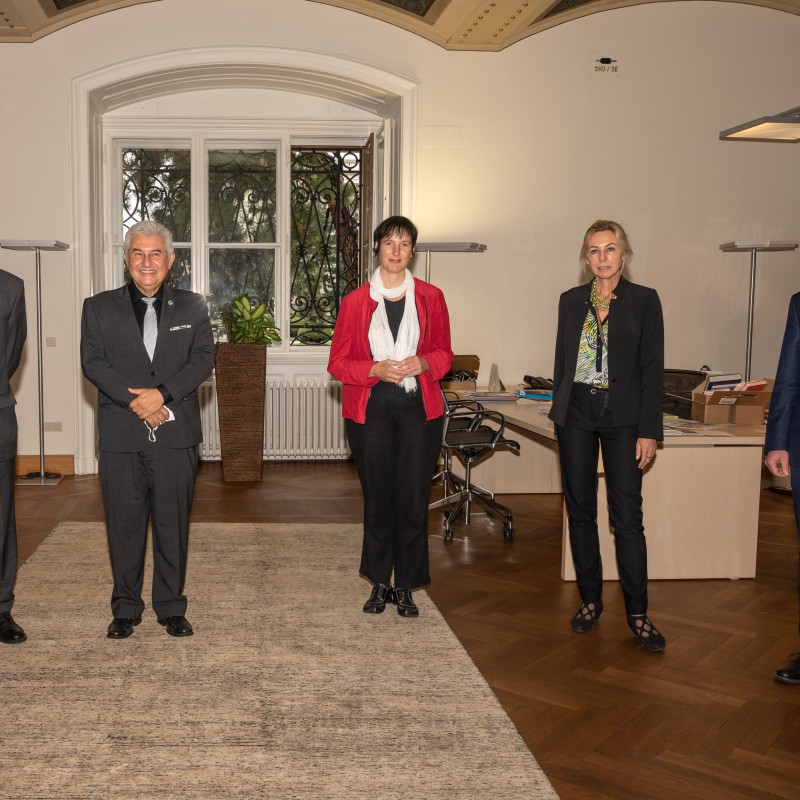Austria - Brazil: Prosperous natural science since the early 19th century NHM Vienna welcomes Brazil's Science Minister to intensify research cooperation
25. September 2020
„Anyone with a sense
of the beauty of nature must feel an emotion when they step into a Brazilian jungle where a tree has never fallen by human
force, where they are all still standing as they stood originally, like pillars supporting the high dome of the ever green
temple of nature.”
Johann Christian Mikan in a letter in April 1818
Johann Christian Mikan in a letter in April 1818
The Brazilian Minister of Science, Marcos Cesar Pontes, is visiting the NHM Vienna with a research delegation on Friday, 25
September 2020 to intensify scientific cooperation in the field of nature research. Close scientific relations between Austria
and Brazil have existed for over 200 years.
In the 19th century, the Austrian Imperial family had several large expeditions to Brazil carried out. The first and most famous one started in 1817 on the occasion of the marriage of Archduchess Leopoldine, the second eldest daughter of the Austrian Emperor Franz I (II), to the Portuguese heir to the throne Dom Pedro I of Alcantara, the later Emperor of Brazil.
The 14 natural scientists involved, especially the expedition leader and professor of natural history Johann Christian Mikan (1769-1844), the taxidermist and zoologist Johann Natterer (1787-1843), the mineralogist and botanist Johann Baptist Emanuel Pohl (1782-1834) and the gardener Heinrich Wilhelm Schott (1794-1865), were not limited neither financially nor by time, which is unique in the history of expeditions. Johann Natterer stayed the longest, 18 years, in Brazil.
The explorers sent more than 150,000 objects to Vienna, where a special Brazilian Museum (the so-called "Brasilianum" in Vienna's Johannesgasse) was established for this purpose in 1821. In 1835, the museum was closed and most of the objects were transferred to the „Vereinigte Naturaliencabinete”, the forerunner of the Natural History Museum Vienna, where they formed the basis of the important collections. In 1928, a part of the Brazilian holdings went to the present “Weltmuseum”.
In the entire history of Austrian collections, never again should such a large number and variety of natural objects from an expedition end up in Austrian museums. These collections are still relevant for international research today.
Diplomatic and scientific relations between Austria and Brazil, which became formally independent from Portugal in 1822, have existed since that time. Against the background of the agreement on scientific cooperation between Austria and Brazil signed in 2019 and on the visit to the NHM Vienna of the Brazilian Minister of Science, Marcos Cesar Pontes, who is the first and so far only Brazilian space traveller, including a delegation, the staff of NHM Vienna is looking forward to further and future cooperation with scientists from Brazil in order to intensify existing research cooperations and to initiate new ones.
In the 19th century, the Austrian Imperial family had several large expeditions to Brazil carried out. The first and most famous one started in 1817 on the occasion of the marriage of Archduchess Leopoldine, the second eldest daughter of the Austrian Emperor Franz I (II), to the Portuguese heir to the throne Dom Pedro I of Alcantara, the later Emperor of Brazil.
The 14 natural scientists involved, especially the expedition leader and professor of natural history Johann Christian Mikan (1769-1844), the taxidermist and zoologist Johann Natterer (1787-1843), the mineralogist and botanist Johann Baptist Emanuel Pohl (1782-1834) and the gardener Heinrich Wilhelm Schott (1794-1865), were not limited neither financially nor by time, which is unique in the history of expeditions. Johann Natterer stayed the longest, 18 years, in Brazil.
The explorers sent more than 150,000 objects to Vienna, where a special Brazilian Museum (the so-called "Brasilianum" in Vienna's Johannesgasse) was established for this purpose in 1821. In 1835, the museum was closed and most of the objects were transferred to the „Vereinigte Naturaliencabinete”, the forerunner of the Natural History Museum Vienna, where they formed the basis of the important collections. In 1928, a part of the Brazilian holdings went to the present “Weltmuseum”.
In the entire history of Austrian collections, never again should such a large number and variety of natural objects from an expedition end up in Austrian museums. These collections are still relevant for international research today.
Diplomatic and scientific relations between Austria and Brazil, which became formally independent from Portugal in 1822, have existed since that time. Against the background of the agreement on scientific cooperation between Austria and Brazil signed in 2019 and on the visit to the NHM Vienna of the Brazilian Minister of Science, Marcos Cesar Pontes, who is the first and so far only Brazilian space traveller, including a delegation, the staff of NHM Vienna is looking forward to further and future cooperation with scientists from Brazil in order to intensify existing research cooperations and to initiate new ones.
Gruppenfoto (von links nach rechts):
S.E. José Antonio Marcondes de Carvalho, Brasilianischer Botschafter in Österreich
S.E. Marcos Pontes, Brasilianischer Minister für Wissenschaft, Technologie, Innovation und Kommunikation
Dr. Katrin Vohland, Generaldirektorin und wissenschaftliche Geschäftsführerin des NHM Wien
Dr. Sabine Eggers, Anthropologische Abteilung des NHM Wien
Mag. Markus Roboch, Wirtschaftlicher Geschäftsführer des NHM Wien
© NHM Wien / C. Rittmannsperger
S.E. José Antonio Marcondes de Carvalho, Brasilianischer Botschafter in Österreich
S.E. Marcos Pontes, Brasilianischer Minister für Wissenschaft, Technologie, Innovation und Kommunikation
Dr. Katrin Vohland, Generaldirektorin und wissenschaftliche Geschäftsführerin des NHM Wien
Dr. Sabine Eggers, Anthropologische Abteilung des NHM Wien
Mag. Markus Roboch, Wirtschaftlicher Geschäftsführer des NHM Wien
© NHM Wien / C. Rittmannsperger


